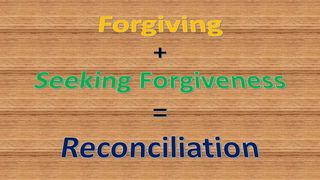Forgiveness
Coordinating Forgiving and Seeking Forgiveness
When a person is ready to be forgiven, the other may not be ready to forgive.
Posted December 5, 2018
I have stated previously that to forgive is courageous and even heroic when treated unjustly by others. As you do the hard work of being good to those who are not good to you, as you approach the other with this offer of forgiveness, it sometimes can get complicated. The complications then can lead to new hurts and even a new opportunity to forgive. Consider six issues regarding the granting of forgiveness and the seeking of it:
1. When people forgive, they go through what can be a lengthy and challenging process. They commit to doing no harm to the one who was offensive. They try to see the offending person in a much wider context than only the offending behavior. They try to see the inherent worth in the other, offer compassion, stand in the pain lest they give that pain right back to the other, and they try to be merciful. Such overtures at times can backfire as the other is not ready to seek forgiveness. Thus the forgiver might be met with such statements as: "What do you mean? I did nothing wrong. You are overly sensitive and are over-reacting."

2. When people have offended and seek forgiveness, they, too, go through a potentially lengthy and challenging process. They try to see the offended person as wounded, as in need of some assistance to overcome the hurt. The offending people see the inherent worth of the offended, have empathy on what they are enduring, and want to reach out to make things right. Such overtures at times also can backfire as the offended one is not ready to forgive. The forgiveness-seeker might be met with these kinds of statements: "What's your game now? You are constantly doing this and I have had it. Don't bother me with your sob story."
3. The take-home message for those of you either trying to forgive or seeking forgiveness is this: Try to see where the other person is in the process (of either forgiving or seeking it). Both of you may be in very different developmental places in your respective healing journeys. Getting a sense of which of you is far along and which of you is not ready is highly important so that each of you can be patient with the other and with the self.

4. The offering of forgiveness and the seeking of it usually is intended to effect the goal of reconciliation. Reconciliation, or the coming together again in mutual trust, usually occurs when forgiving and the seeking of forgiveness both have first been accomplished or at least well on the way toward the completion. Reconciliation sometimes can be scary. Can I trust the other person? How do I know the other truly is trustworthy?
5. To help you answer the trust questions when you are forgiving, try to ascertain the other's situation with regard to what I call "the three R's" of remorse, repentance, and recompense (Enright, 2012). Remorse is inner sorrow. Is the other sorry for what happened? Repentance is the language used to express the remorse. Has there been an apology (not necessary for forgiveness, but often necessary for deep reconciliation). Recompense is making amends within reason and some acts have no recompense (for example, I know of a woman whose daughter was murdered and there is no actual recompense there).

6. As you navigate the forgiving, the seeking of forgiveness, and the reconciliation, please be aware of power plays or using any of these for self-interested purposes. Genuine forgiving, seeking forgiveness, and reconciliation are between and among human equals in which all parties have inherent worth and this is seen and acknowledged.
Keeping in mind these six issues may help you restore important relationships and avoid manipulation and continued hurt from others.
References
Enright, R.D. (2012). The forgiving life. Washington, DC: APA Books.


